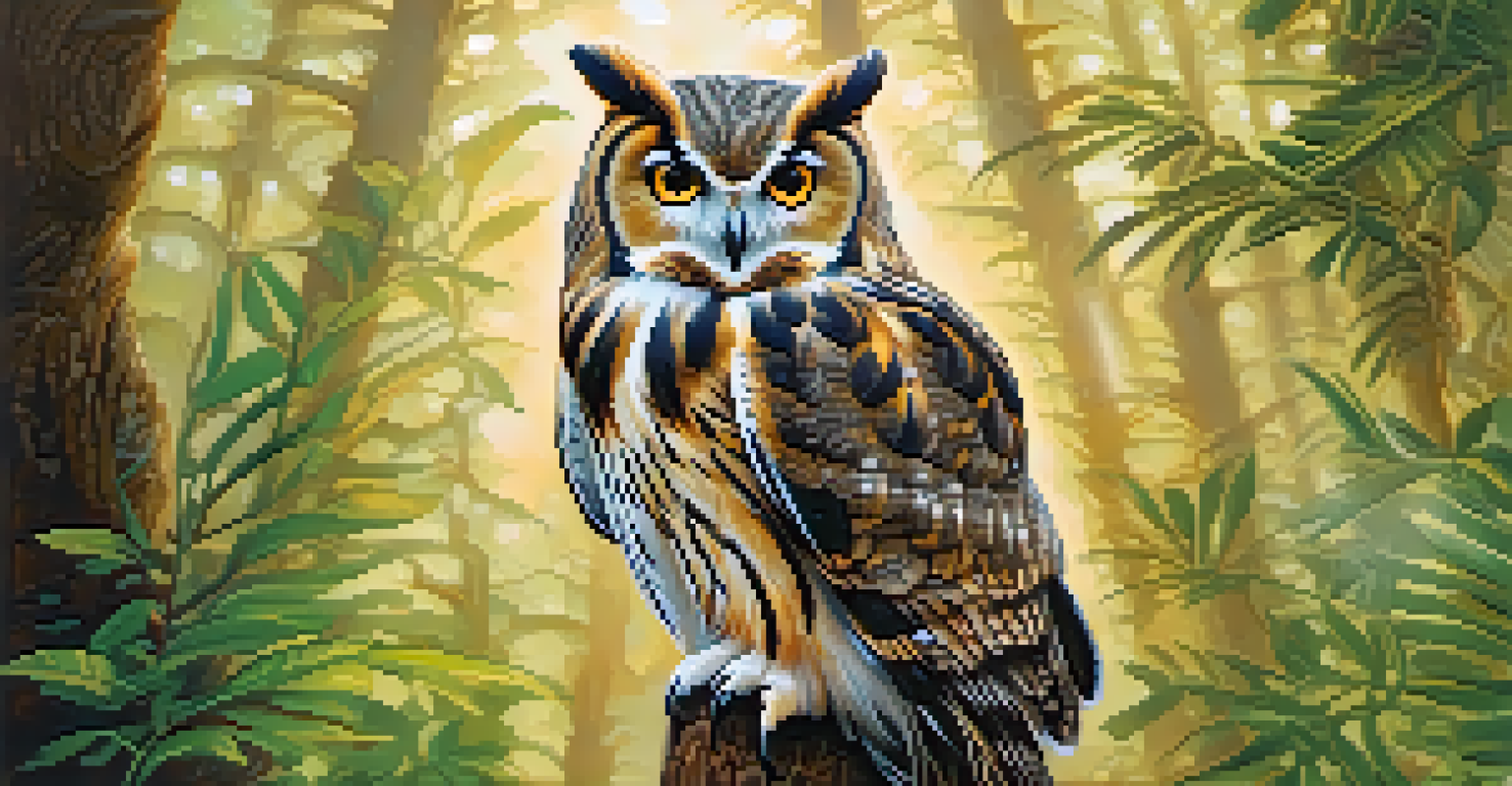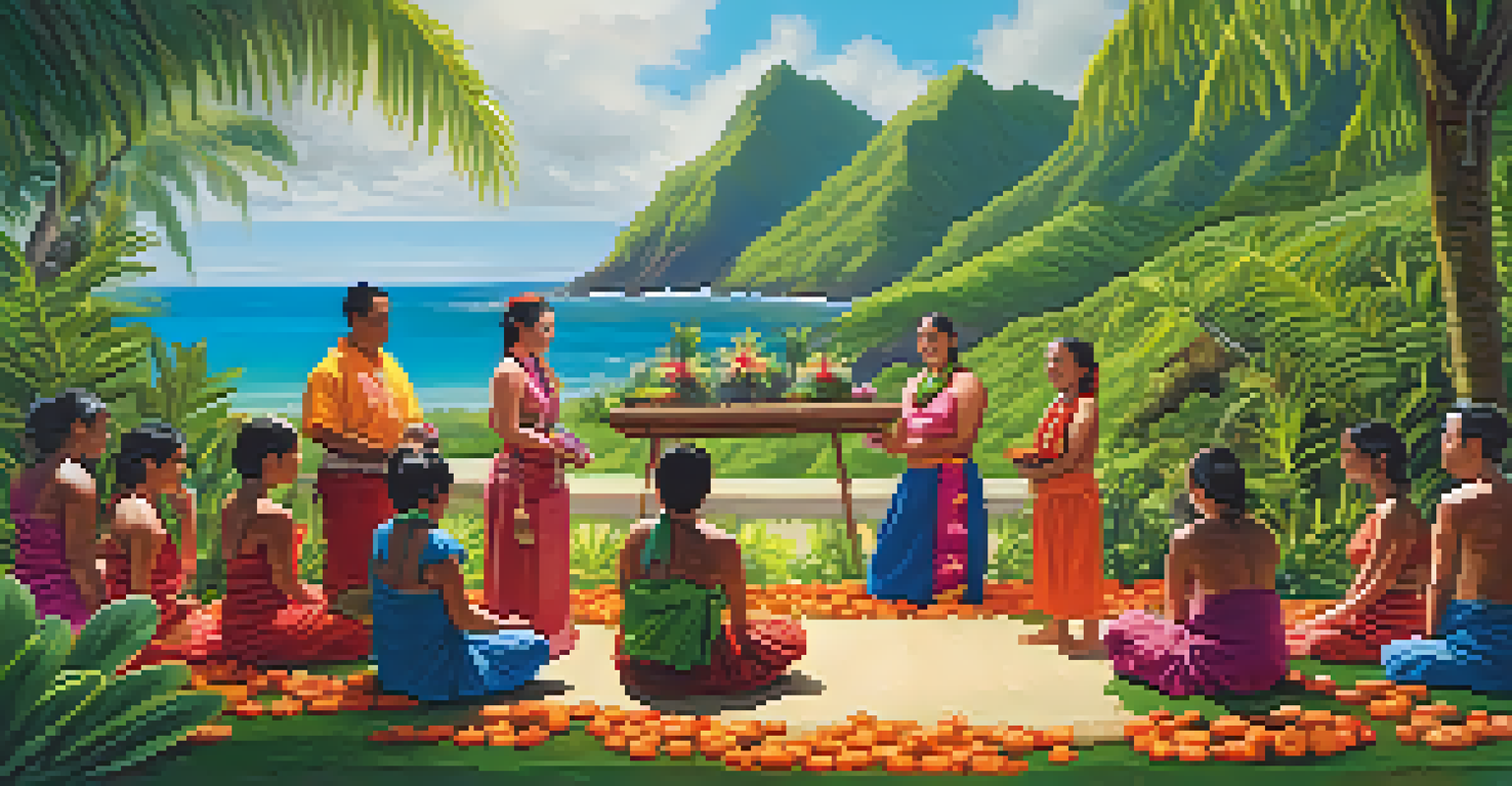The Role of ʻAumakua in Hawaiian Spiritual Beliefs Explained

What are ʻAumakua in Hawaiian Culture?
In Hawaiian culture, ʻAumakua are considered ancestral spirits that guide and protect individuals and families. They can take on various forms, often representing animals, plants, or even natural elements. These spiritual guardians are believed to communicate with their descendants, providing wisdom and insight into life's challenges.
The land is alive, and it is full of ancestral spirits that guide us.
The significance of ʻAumakua lies in their personal connection to family lineage. Each family may have its own unique ʻAumakua, which reflects their specific ancestry and cultural heritage. This relationship reinforces the idea that spiritual guidance is deeply rooted in familial ties and history.
For many Hawaiians, honoring their ʻAumakua is an essential part of their spiritual practice. Rituals and offerings are often made to acknowledge these guardians, ensuring their presence and protection in daily life. This practice fosters a sense of belonging and continuity within the community.
The Spiritual Connection to Nature
ʻAumakua are often associated with elements of nature, which reinforces the deep connection between spirituality and the environment in Hawaiian beliefs. For example, a family’s ʻAumakua might manifest as a shark, owl, or even a specific tree, symbolizing their bond with these natural entities. This relationship highlights the respect Hawaiians have for the natural world as a source of guidance and protection.

This spiritual connection emphasizes the importance of stewardship. By recognizing their ʻAumakua in nature, individuals are reminded of their responsibility to care for the land and its resources. This philosophy encourages sustainable practices that honor both the environment and ancestral spirits.
ʻAumakua as Ancestral Spirits
In Hawaiian culture, ʻAumakua are ancestral spirits that guide and protect families, representing a deep connection to their lineage.
Moreover, the natural manifestations of ʻAumakua serve as reminders of the lessons they impart. For instance, an owl might symbolize wisdom, guiding family members to make thoughtful decisions. This connection to nature fosters a holistic understanding of life, where every element plays a role in spiritual growth.
Rituals and Offerings to ʻAumakua
Rituals and offerings are vital expressions of reverence toward ʻAumakua, helping to maintain a strong spiritual connection. Families often create altars adorned with items that represent their ʻAumakua, such as shells, flowers, or personal mementos. These altars serve as spaces for reflection and communication, where individuals can seek guidance and express gratitude.
We are all connected to our ancestors; they are our guiding stars.
Traditional practices might include chanting, prayers, or even sharing stories about the ʻAumakua. These activities foster a sense of community and continuity, as individuals come together to honor their shared spiritual heritage. Such gatherings reinforce the significance of ʻAumakua in their lives and the collective memory of the family.
Additionally, offerings, such as food or crafted items, are made to appease and show appreciation to the ʻAumakua. This reciprocal relationship between humans and ancestral spirits emphasizes the importance of gratitude and respect in Hawaiian spirituality. It teaches that nurturing this connection is essential for personal and communal well-being.
Personal Experiences and Anecdotes
Personal stories often illuminate the profound impact of ʻAumakua in everyday life. Many individuals share experiences where they felt guided or protected by their ancestral spirits during challenging times. These anecdotes serve as powerful reminders of the ongoing presence of ʻAumakua in their lives, reinforcing the belief that they are never truly alone.
For instance, someone might recount a moment when they encountered a specific animal that their family considers their ʻAumakua. This encounter could be interpreted as a sign or message, providing comfort or guidance during a difficult decision. Such stories highlight how personal experiences with ʻAumakua create a deep, emotional connection to one’s spiritual beliefs.
Nature's Role in Spirituality
ʻAumakua often manifest as elements of nature, highlighting the respect Hawaiians have for the environment as a source of guidance.
These narratives not only strengthen individual faith but also serve to educate younger generations about the significance of ʻAumakua. Sharing these experiences fosters a sense of belonging and continuity within families, ensuring that the wisdom of ancestors is passed down through time.
The Role of ʻAumakua in Guidance and Protection
One of the primary roles of ʻAumakua is to provide guidance and protection to their descendants. Many Hawaiians turn to their ʻAumakua during times of uncertainty, seeking advice and reassurance. This relationship is built on trust, as individuals believe their ancestral spirits have a vested interest in their well-being.
The guidance offered by ʻAumakua can manifest in various ways, from dreams and visions to signs encountered in everyday life. For example, a person might feel a strong instinct to avoid a particular path, later realizing it was a protective sign from their ʻAumakua. Such experiences reinforce the belief that these spirits are actively involved in the lives of their families.
This protective role is particularly significant in the face of challenges, such as illness or emotional distress. Many individuals report feeling comforted by the presence of their ʻAumakua, believing that they are being watched over and cared for. This sense of security fosters resilience, allowing people to navigate life's difficulties with a greater sense of peace.
Cultural Representation of ʻAumakua
The concept of ʻAumakua is deeply woven into Hawaiian art, mythology, and storytelling, serving as a rich source of inspiration for cultural expression. Artists often depict their ʻAumakua in various forms, allowing for a visual representation of these spiritual connections. This artistic expression helps to keep the traditions alive and accessible to future generations.
Mythological stories about ʻAumakua often convey important lessons about respect, responsibility, and the interconnectedness of life. These narratives not only entertain but also educate, instilling cultural values that resonate with the community. By sharing these stories, Hawaiians preserve their rich heritage and pass down knowledge that shapes their identity.
Rituals Honor Spiritual Connections
Families engage in rituals and offerings to honor their ʻAumakua, reinforcing their spiritual ties and sense of community.
Moreover, cultural events and festivals often celebrate the significance of ʻAumakua, bringing the community together to honor their ancestral spirits. These gatherings reinforce the collective identity of Hawaiians, reminding them of their shared spiritual journey and the importance of their connections to the past.
Modern Interpretations of ʻAumakua
In contemporary society, the understanding of ʻAumakua has evolved, adapting to new contexts while retaining its core significance. Many people incorporate the concept into their daily lives, using it as a source of comfort and strength amid modern challenges. This evolution reflects the adaptability of Hawaiian spirituality, allowing it to remain relevant in a changing world.
Some individuals may interpret ʻAumakua through a more universal lens, relating it to broader concepts of spirituality and guidance found in various cultures. This perspective promotes a sense of unity among different belief systems, highlighting the shared human experience of seeking connection and support from the spiritual realm.

As Hawaiians continue to navigate the complexities of modern life, the role of ʻAumakua serves as a reminder of the importance of maintaining spiritual connections. Whether through traditional practices or personal interpretations, the essence of ʻAumakua remains a vital part of Hawaiian identity, offering guidance and protection for generations to come.